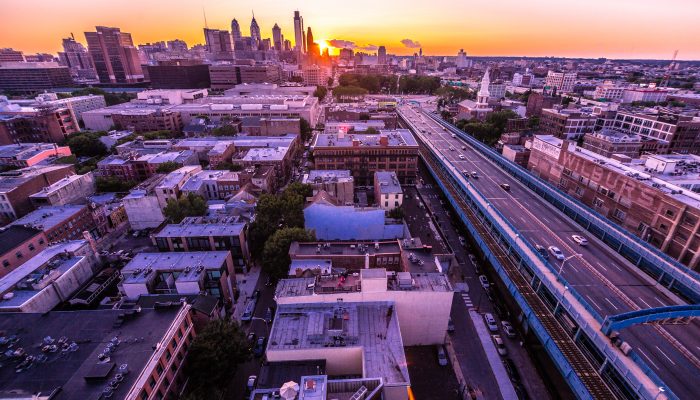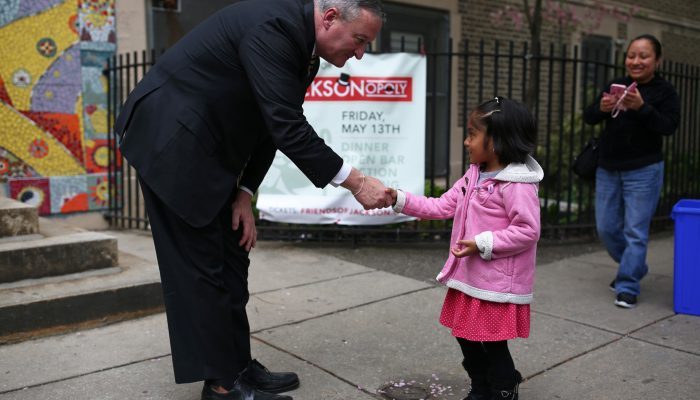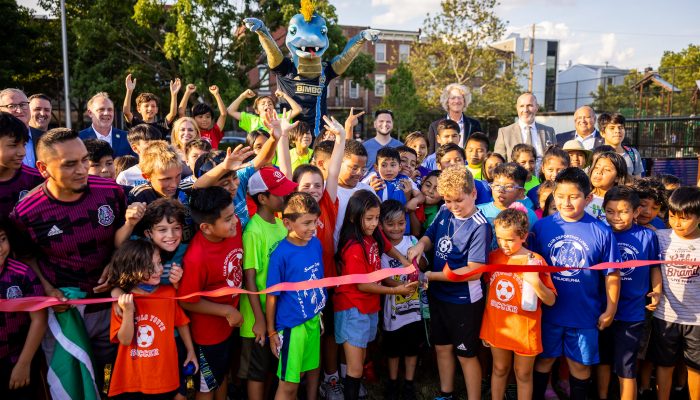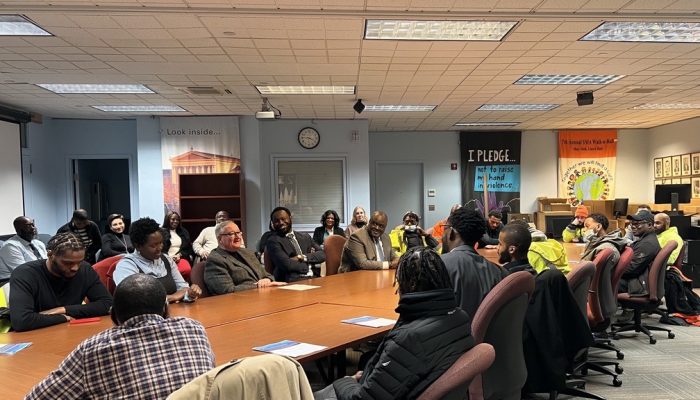Philadelphia is a dynamic, diverse city with a thriving economy that benefits all of its residents.
That’s the overarching vision laid out in Growing with Equity: Philadelphia’s Vision for Inclusive Growth, announced in May. Growing with Equity is the City’s economic growth plan that serves as a framework to help harness Philadelphia’s recent momentum to ensure that future success benefits people in every corner of the city.
Economic growth is essential to ensuring increased opportunities for Philadelphians. When managed well, economic growth can create more opportunities and help reduce inequality.
Six-month progress report
Since Growing with Equity was released, the City has made considerable progress related to the three focus areas of the inclusive growth plan: jobs, talent, and neighborhoods.
Jobs
We’re working to grow the economy to create family-sustaining jobs for all Philadelphians.
In order to grow our local economy, it is critical that we make it easier to do business in the city of Philadelphia. Since Growing with Equity was released, the City has:
- Created a Business Owners’ Bill of Rights outlining the rights entitled to business owners when interacting with City agencies. Announced on October 30, the Business Owners’ Bill of Rights is effective immediately. Learn why one entrepreneur calls the Business Owners’ Bill of Rights a “step toward a more equitable Philadelphia.”
- Launched a new L&I website, which is easier to navigate and provides step-by-step guidance for permitting and licensing processes.
- Eliminated the Business Income and Receipts Tax (BIRT) filing requirement for businesses that make $100,000 or less, beginning in Tax Year 2020.
Small business creation is a key pillar of Philadelphia’s economy. That’s why we’ve moved forward on several initiatives designed to support entrepreneurship. These efforts have a specific focus on diverse business owners—people of color, immigrants, and women—who have traditionally been disenfranchised and underrepresented in the business community. Over the past six months, we have:
- Issued—in collaboration with United Way and PIDC—a Request for Proposals from firms to comprehensively analyze the current entrepreneurial landscape in Philadelphia. The analysis will include a focus on the ecosystem of resources available to diverse business owners, and eventual recommendations to grow entrepreneurship.
- Awarded 13 grants totaling $170,000 to 21 founders from underserved populations in the Philadelphia tech community, as part of the Commerce Department’s Venture program. The Venture program provides funding for technology-related ventures that may not have access to traditional forms of capital and founder networks.
- Solidified a new partnership with Philly Startup Leaders to award up to $150,000 in grants to entrepreneurs from socially or economically disadvantaged backgrounds for the next round of Venture grants. This partnership will broaden the pool of applicants that seek seed funding to get their business off the ground, and provide grantees with structure, education, and programming that will help them succeed in launching their business.
- Raised the threshold for the requirement of a formal bid process from contracts worth $34,000 to $75,000—and to $100,000 for local businesses. This will increase opportunities for small businesses and minority-, women-, and disabled-owned firms by reducing the burden of complicated proposals for relatively small contracts.
- Exceeded our 35% participation goal for minority businesses on City contracts for the first time.
Talent
Our commitment to inclusive growth depends on all Philadelphians being prepared for, and having access to, today’s jobs and those that will be created in tomorrow’s economy.
Growing a talented workforce starts with investing in our youth. Our efforts in building an educational foundation for Philadelphia’s children include:
- Enrolling 3,300 students in free, quality pre-K through PHLpreK in the 2019-2020 school year.
- Expanding the Community Schools program from 12 to 17 schools.
- Making a historic investment of $1.2 billion in local funding in the School District of Philadelphia over five years.
We also have worked to equip adults with the education and skills needed to compete for today’s jobs. In the past six months, we’ve:
- Expanded the adult education system to five myPLACE campuses and eight locations, and increased class offerings at Community Schools and CareerLink® centers.
- Begun work, thanks to a grant from National League of Cities, on helping students complete college degrees and earn industry credentials without hardship in meeting basic needs as food, housing, and transportation.
- Piloted a groundbreaking Same Day Pay program, where participants receive cash for work performed on the same day. Inspired by the efforts of the Scattergood, Barra, and Sheller Family foundations, along with Mural Arts Philadelphia, the program offers connections to resources—ID services, shelter, low barrier employment, behavioral health supports, and other services—ensuring all Philadelphians have an opportunity to start or restart their career journey.
- Created the Workforce Professional Alliance (WPA) resource guide, which includes profiles of quality workforce education and training providers and connects WPA with job candidates and employers.
- Activated a cross-sector group of partners, including the Federal Reserve and Chamber of Commerce, to address Future of Work and focus on preparing Philadelphians for the jobs of tomorrow.
Neighborhoods
Philadelphia’s diverse neighborhoods are among our city’s best assets. Our inclusive growth plan focuses on prioritizing our investments in struggling and middle neighborhoods to reverse the impacts of disinvestment and spur revitalization, while preserving affordability.
To that end, we have:
- Established the Philly First Home Program, which offers Philadelphia residents up to $10,000 in down payment assistance. The goal of this program is to remove barriers to homeownership for middle and low income Philadelphians. To date, nearly 900 households have participated in the program, with over $7.7 million of assistance provided. More than two-thirds of the new homeowners have a low or moderate income. The program is supporting more than $144 million in property sales so far, which will return approximately $5 million in revenue to the City.
- Prevented homelessness and increased affordable housing options. In 2018, the Office of Homeless Services (OHS) piloted a “shallow rent” program where people pay a modest, fixed amount toward housing and the City pays the rest. After one year, the OHS program had a 97.5% success rate, so it was doubled from 40 to 80 participant households. Those in the program are typically living with disabilities and all have low, fixed incomes. In early 2020, PHDC is piloting a companion program for tenants who are cost burdened, spending more than 30% of their income on housing, and may be at risk of eviction, but who only need a small amount of rent assistance. PHDC’s “shallow rent” support will be able to serve upwards of 1,000 households per year.
- Increased funding from $950,000 to $2.1 million for the eviction prevention program.
- Initiated projects at 60 neighborhood parks, recreation centers, and libraries representing more than $124 million in committed or expended funds for the Rebuild initiative and its programs.
- Invested in beautifying our neighborhoods, committing $2.3 million over the next five years for street cleaning and launching a mechanical cleaning pilot in six neighborhoods. City Council also recently allocated an additional $10 million for regularly scheduled cleaning on commercial corridors.
- Secured nearly $14 million in grants for engineering infrastructure and education that will be used to support projects along High Injury Network corridors as part of the City’s Vision Zero efforts.
- Issued a Request for Proposals for a Commercial Real Estate Acquisition Loan Fund, which will support the acquisition of commercial and mixed-use property by community development organizations and small business owners, who might otherwise be unable to because of financial barriers.
While this progress is significant, we must continue to be diligent and intentional about creating an environment that provides opportunities for success to everyone—especially those who often have been left behind.
The City, working with partners in the private and nonprofit sectors, will continue to implement meaningful changes that drive inclusive growth.




